This homemade disinfectant spray ia a natural cleaner that can help protect your family from germs during cold and flu season. It can also be used to clean cutting boards and kitchen counters while cooking. Learn how to make your own lemon disinfecting cleaner for an easy, frugal cleaning solution that can help protect your health.
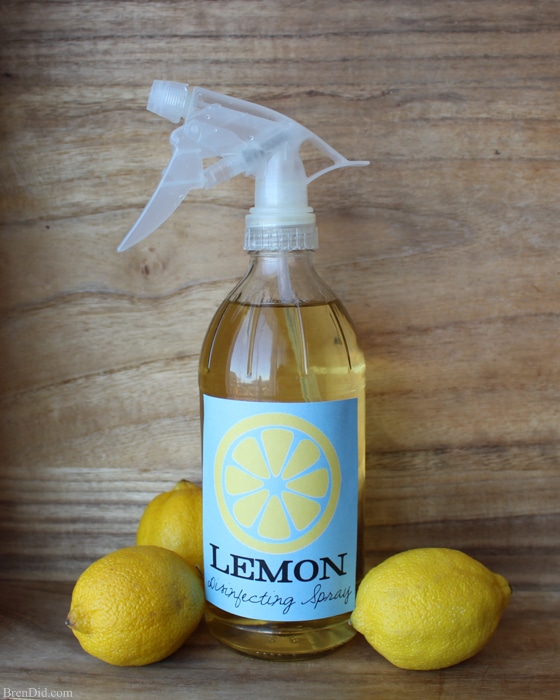
This post uses affiliate links. They don’t cost you a thing and help us bring you green cleaning tutorials. Read more in Policies & Disclosures.
I stopped using commercial disinfecting cleaners in my home when I learned that they could contain hazardous chemicals and indoor air pollutants. These substances can cause health problems including asthma, hormone disruption, heart disease, cancer, headaches, eye irritation, congestion, and nausea.
Plus manufacturers of cleaning products in the United States do not have to list all the ingredients on their labels. This means that you have no idea what you are exposing your loved ones to when you reach for most commercial cleaners.
I did a litte research and learned that’s it’s easy to make you own homemade disinfecting cleaner that contains the same active ingredient found in many commercial cleaners but none of the dangerous additives.
Choosing a Natural Disinfectant
This homemade disinfectant spray uses two simple ingredients to naturally kill germs: ethanol and lemon oil.
- Ethyl alcohol (ethanol) is a common disinfectant used in the United States. Ethyl alcohol is a potent virucidal agent and is commonly used as an active ingredient in hand disinfectants for healthcare workers.
- Ethanol is sold as vodka or grain alcohol in the United States. You must read the proof label on the bottle for the correct ethyl alcohol concentration.
- Lemon oils are found in the rind of citrus fruit, a common grocery store staple, and have show strong antimicrobial activity.
- No need to run out and buy lemon oil, the lemon oil in this cleaner naturally comes from the rinds of a lemon when it is steeped in vodka or grain alcohol. Save the lemon fruit or juice for other recipes.
Using Ethanol as a Disenfecting Cleaner
Why choose ethanol for this homemade cleaner? Ethyl alcohol (ethanol) is readily available plus it’s germicidal, bactericidal, tuberculocidal, fungicidal, and virucidal when used at the correct concentration. According to the CDC:
- Salmonella typhosa, E, coli, and Serratia marcescens are killed by 40-100% ethanol
- COVID-19 (coronavirus) is killed by 70% ethyl alcohol solutions.
- Staphylococcus aureus and Streptococcus pyogenes are killed by ethyl alcohol concentrations of 60%–95%.
- Lipophilic viruses (e.g., herpes, vaccinia, and influenza virus) are inactivated by ethyl alcohol concentrations of 60%–80%
- Hydrophilic viruses (e.g., adenovirus, enterovirus, rhinovirus, and rotaviruses) are inactivated by ethyl alcohol concentrations of 60%–80%
Where to Buy Ethanol
Ethanol can be purchased in the United States two ways:
- As pure ethyl alcohol (also called vodka or grain alcohol). This is the only type of alcohol that you can drink without harming yourself.
- As denatured ethyl alcohol. This alcohol that is made unfit for human consumption by adding chemicals to it to make it poisonous.
This recipe used pure ethyl alcohol which is sold at liquor retailors in the United States as unflavored vodka or clear grain alcohol.
- Vodka sold in the United States has a minimum ethanol content of 40% alcohol by volume (labeled as 80 proof).
- Other grain alcohols such as Everclear have a higher ethanol content of 60%, 75.5%, 94.5% and 95% alcohol by volume (labeled as 120, 151, 189, and 190 proof respectively).
*Other types of denatured alcohol are available in the U.S. These include isopropanol (rubbing alcohol or isopropyl alcohol) and methanol (methyl alcohol).
**Do not substitute any other alcohols or denatured alcohol for the ethanol in this recipe. The resulting cleaner will contain additional ingredients that could be dangerous to inhale and may not be safe on food surfaces.
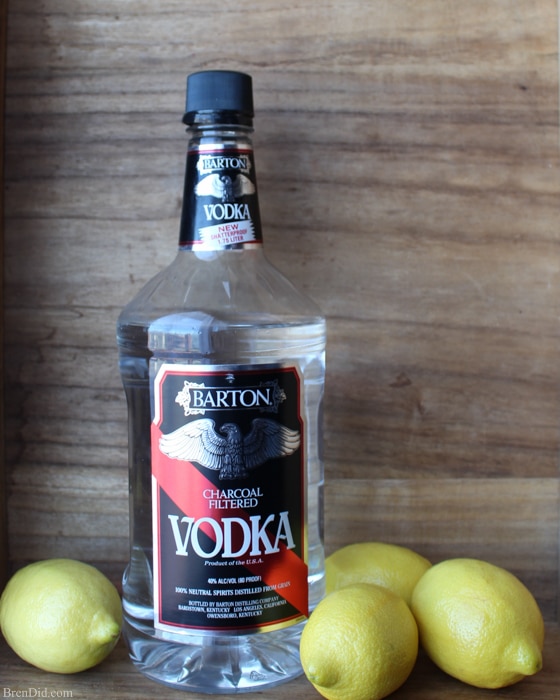
How to Make Lemon Infused Disinfectant Spray Cleaner
Ingredients
- Unflavored vodka or grain alcohol (use a cheap variety for everyday cleaning, choose a higher proof for killing viruses such as coronavirus)
- 4-6 Fresh Lemons
Directions
1.Wash and peel the lemons, place rinds in a glass jar. Cover the rinds with vodka and allow to steep in a cool dark place for 1-6 weeks. (This is called infusion.)
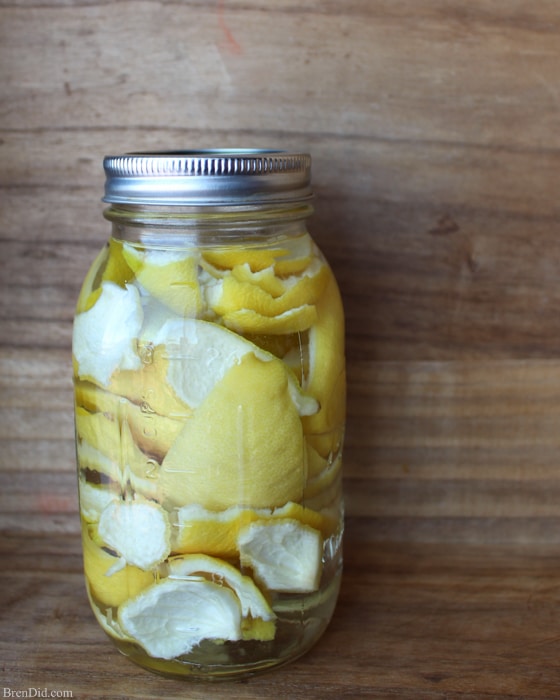
2.The cleaner is ready when it becomes a yellow color. For more concentrated lemon oil and a darker color, allow to steep for a longer time. Remove the lemon rinds and any solids by pouring the liquid though a sieve or cheesecloth. (This is called filtration).
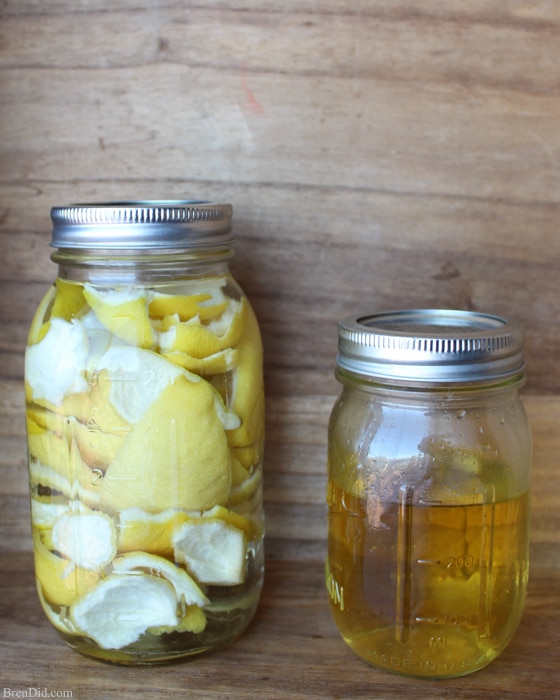
3. Pour the cleaner into a spray bottle. Do not dilute! Download the PDF labels and attach. (I print mine on adhesive full-size labels for easy application.)
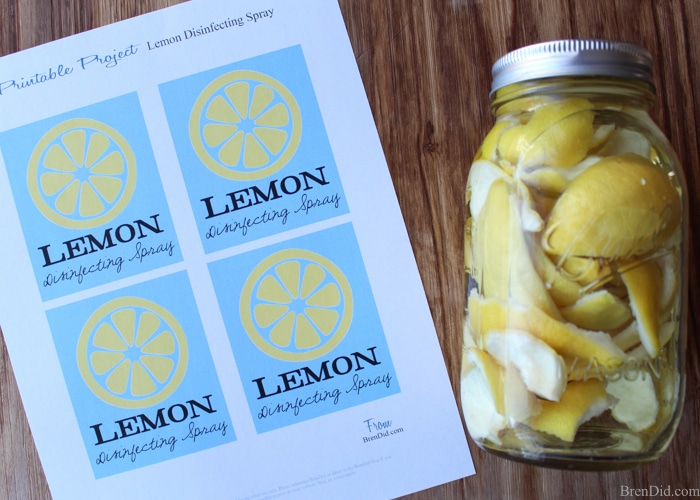
How to Use Homemade Disinfectant Spray
- After removing all visible dirt and soils with a damp cloth, spray the lemon cleaner directly onto solid surfaces you want to disinfect including countertops, cutting boards, toilet seats, floors, and more!
- Allow the disinfectant at least 10 seconds of dwell time to kill germs. (Dwell time is the amount of time a cleaner must stay wet on a surface to be effective. According to the CDC, ethanol can kill Serratia marcescens, E, coliand Salmonella typhosa in 10 seconds.)
- Wipe the surface dry with a clean cloth (if desired). There is no need to rinse.
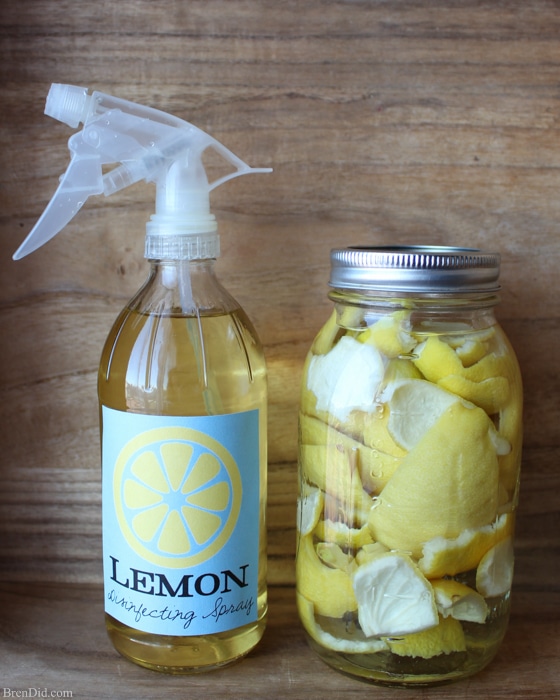
Homemade Disinfectant Spray FAQ
- Should I dilute the cleaner with water? It depends on desired alcohol content in the cleaner and what you used to make your infusion.. If you want to kill respiratory viruses you need a minimum 70% ethyl alcohol solutions. A dilution of 1 cup lemon cleaner made with 190 proof alcohol: 1 cup water will create a 95 proof cleaner which is 47.5% alcohol, not high enough to kill some viruses. It’s much simpler to start with a bottle of ethyl alcohol that is the same concentration you desire in your cleaner and not dilute.
- Why do I need to clean before disinfecting? Cleaning removes germs from surfaces but does not necessarily kill them. Disinfecting kills germs but does not necessarily remove them from surfaces. The CDC recommends both steps (with separate cloths) to best protect your family.
- Can I use vinegar in place of alcohol? The CDC does not list vinegar as an approved disinfectant to prevent respiratory viruses. You can make my easy infused vinegar for other household cleaners, just not this disinfectant.
- Can I use rubbing alcohol in place of ethanol? All rubbing alcohol sold in the United States is denatured (not fit for human consumption) therefore I do not recommend using it to clean food surfaces.
- Can I use plain ethanol to disinfect? Absolutely! You can grab a bottle of 151 proof (75.5% alcohol) or higher and get to cleaning. The lemon adds some scent and a little boost from the lemon oils but the plain alcohol works fine too!
- Can I add essential oils to the cleaner? Essential oils have been shown to have disinfectant (antifungal, antibacterial) properties. But EOS can cause adverse reactions in children, adults, and pets including allergic reactions, skin irritation or rash, and neurological impartment. Health experts recommend limiting the use of many EOS on food contact surfaces and in homes with sensitive individuals (young children, pregnant women, people with respiratory issues, and certain pets).
- Why do I need to let this cleaner sit? All disinfecting cleaners, both homemade and commercial, require a certain amount of time to kill germs and bacteria. This time is called dwell time. It’s a huge problem with commercial cleaners because most people do not read the label and do not let the cleaner sit for the time indicated. Be safe, let it sit (and read your cleaner labels!).
- What household ingredients can I use to disinfect my home? Hydrogen peroxide, ethanol, and isopropanol are the only natural disinfectants that have been approved by the CDC.
Always Use Your Best Judgement
There is, of course, an exception to every cleaning rule. If you live in a home with an immune compromised individual, you may be advised to use different cleaning products. Be safe and listen to your doctor’s advice.
Like my green cleaning tutorials? Sign up for my newsletter below and never miss a thing!

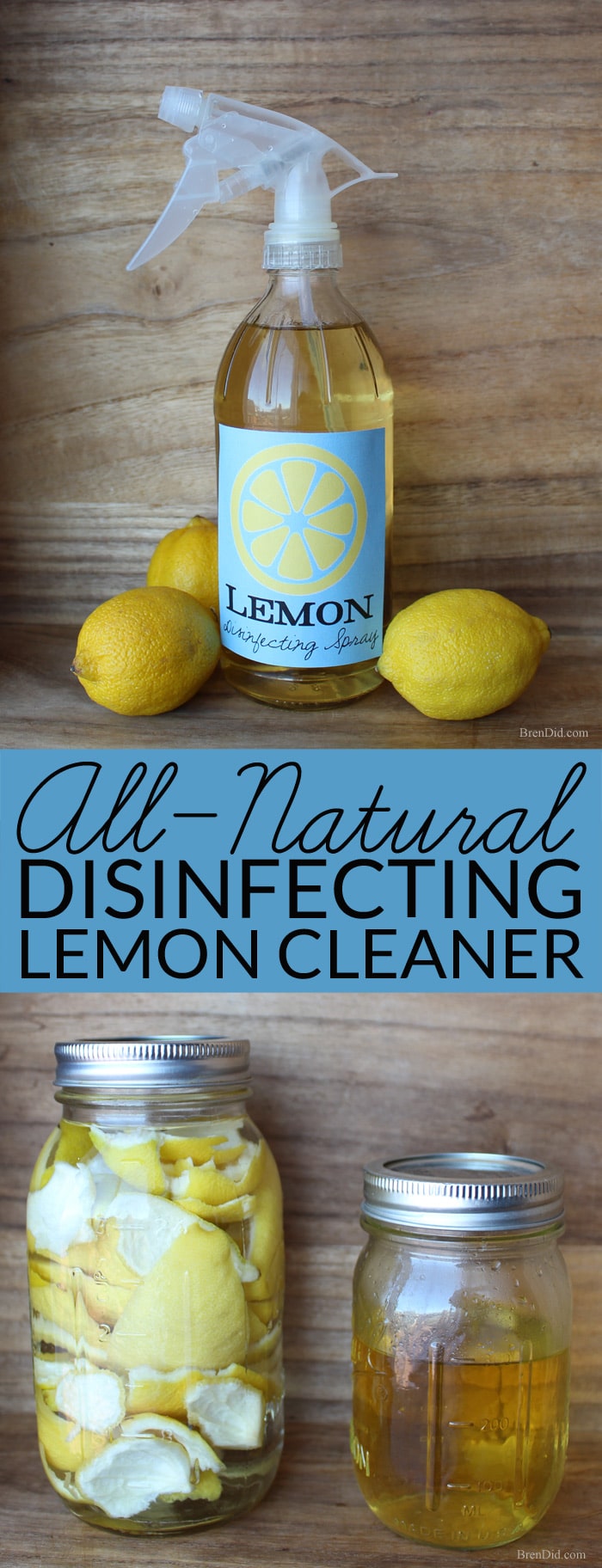


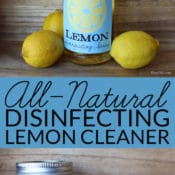
Tina
Hi! Great site! I’m making the sanitizer this weekend. Question: is it too acidic to use on granite or stone countertops or should it be fine? Ill be making mine with vodka and lemon peels.
Bren
Thanks, Tina! I prefer to use my easy all-purpose cleaner on granite to protect the finish. It’s super mild and easy to make.
Hanna
Can I use gin instead of vodka? I like the smell and I accidentally bought gin.
Bren
I have only used vodka.
Joey Smith
What would you reccommend as a cleaning/disinfectant for a child’s mattress. Keep in mind, the child is potty trained, however, he occasionally wets the bed. After the first time, I soaked up the the excess urine with paper towels and then sprayed the mattress with a disinfectant spray, let it set for 10 seconds and cleaned it again with fresh paper towels. I then sprayed it again with the disinfectant spray and let it sit for 10 minutes and used some more fresh paper towels to clean up the disinfectant spray from the mattress. I also used some large alcohol wipes to clean the mattress as well. I actually used the large alcohol wipes before applying the disinfectant spray. I am waiting for a mattress protector for my child’s bed. Do you have any suggestions for temoving any remaining urine odor even after the surface of the mattress has dried after I cleaned it initially?
Thank You.
Joey Smith
Bren
I like to use vodka to remove odors from smelly shoes and gym bags, simply fill a spray bottle, spray until damp and air dry. You could also try sprinkling this homemade deodorizing powder on a dry mattress and then vacuuming clean
Jeanne
A 50/50 solution of White Vinegar/Water will kill the urine odor. Learned this secret from a nurse at an assisted living home for seniors. It also removes the odor of urine from clothing.
L.A. Lyman
This is really late, but if you have a fresh urine stain, blot up as much as you can, sprinkle it with baking soda, and don’t be cheap. Let dry, then vacuum. For an older stain, spray with water to moisten the affected area, then again, sprinkle a lot of baking soda on top , let dry and vacuum. The stain and odour should be gone, if not, do it again. This won’t disinfect the area, but should remove the stain and smell. You can then spray with the disinfecting spray on this site, spraying quite well and letting dry thoroughly. This also works with vomit, and works in the car for anyone with motion sickness. Let’s hear it for baking soda!
Kristine
I wonder if this is good for a glass cleaner? Really looking for and all in one disinfectant, glass, bathroom cleaner.
Bren
It is not the best glass cleaner. You can use plain vinegar to clean glass or my homemade glass cleaner.
Rshoots
I use hydrogen peroxide in the bathroom. It is also excellent on the mirrors and chrome surfaces. A little more rubbing required but in the end a better shine than even Windex.
Bren
Thanks for the great suggestion!
Rehanna
Hello, I just discovered your site and am so excited! I am looking use more natural cleaning products with less chemicals but still disinfect. I am curious why you do not use rubbing alcohol. I’ve come across other sites that use rubbing alcohol instead of vodka. Is rubbing alcohol harmful? I ask because I do not purchase drinking alcohol and liqueurs as it is prohibited in my religion.
Bren
Rehanna, Isopropyl Alcohol (Rubbing Alcohol) and Ethanol/Ethyl Alcohol (Vodka/Grain Alcohol) both work the same way when used as disinfectants: they both disrupt the proteins and lipids in viruses and bacteria, which kills those germs. (Note: The U.S. Centers for Disease Control recommends a solution of 65 to 95 percent alcohol, either ethyl alcohol or isopropyl alcohol.) So, either of the two alcohols could be used in many cleaners. I choose Ethanol (Vodka) because Isopropyl Alcohol (Rubbing Alcohol) is more dangerous to ingest or inhale (you can compare their ratings on the EWG here:
Ethanol and Isopropyl Alcohol. Plus, Isopropyl Alcohol (Rubbing Alcohol) has a strong odor when compared to Ethanol/Ethyl Alcohol (vodka/grain alcohol), which tends to linger and can cause headaches, dizziness, and other unpleasant effects according to Poison Control. Of course, you should pick the ingredient that works with both your religion and green cleaning goals. Hope this helps! -Bren
Samantha
I accidentally bought vodka that was only 40%. It’s infusing now but can I add it to Everclear or will that dilute it too much to no longer be effective?
Bren
It will still infuse with 40% vodka, you can add Everclear to boost the disinfecting power but you would have calculate the dilution ratio based on the amount of vodka used.
Kristi
Hi. Can I make this with orange peels??
Bren
Yes, it will work with any citrus peels!
Kenlynn
How long will the vodka solution store? With water and without water added (I’m assuming the bacteria in the water added will be killed by the vodka, correct?
Bren
Kenlynn, I’ve kept the spray stored for several months with no problems. The vodka will kill some bacteria but if you have highly contaminated water I would use distilled water.
Rina Willig
Does it smell good?
Bren
It has a light lemon odor.
Noel Perry
Hi! I read that this has to be wiped off- so is this not safe to use on fabric? Could I use this to spray on my son’s book bag when he gets home from school?
Bren
I would not use it on a bookbag. I would use this spray on a bookbag.
Kate Hartland
Hi Bren! I have been a buge fan of your Healthy Oatmeal Muffins for a while now but just started exploring your site! Love the green cleaning and natural body tabs. Do you know – would I be able to throw the lemon rinds in the compost once I’m done infusing?
Thank you!
Bren
Yes, I put them down the disposal (just one or 2 at a time) after infusing.
Samantha Pedraza
I was under the impression that the alcohol has to be 60% or higher?
Strangely enough, this is exactly how I make my lemon extract for baking.
Beth
Hi Bren, can I use it as hand sanitizer? Thank you.
Bren
I have never used it as a hand sanitizer so I am not sure how tough it would be on your skin long term.
CC
Hi Bren. What makes pure ethyl alcohol, unlike rubbing alcohol, safe to be used on wood and wood finishes? Is it as safe to be repeatedly used as the all purpose all surface cleaner (detergent + water) on wood surfaces?
I enjoy reading your blog. Thank you for this great relevant article. I shared it with many family members and friends. It’s good to know that how and in what ways our cleaning efforts answer our needs, especially in a time of a mysterious infectious disease. I hope that you and your family are staying safe.
Bren
CC, neither ethyl alcohol or rubbing alcohol are good for wood finishes in the long term and should be used sparingly on finished wood. Hopefully, most household surfaces that need regular disinfecting (door handles, toilet seats, sinks) are not made of wood. Ethyl alcohol is safer for food preparation surfaces (i.e. unfinished wooden cutting boards) because it is not poisonous to humans. Spraying poisonous rubbing alcohol on a wooden cutting board would allow it to be absorbed into the wood and could make you sick when you use it to prepare food. Hope this clarifies the use issue for you. -Bren
Rain
Hello!!! I love this post, but I have a question: is this sanitizer harmful to animals like chickens? Because I have been looking for a way to disinfect the chicken coop with homemade natural products and this seems perfect…. so I ask if it can be used to disinfect the chicken coops (without harming the chickens).
Thank you
Bren
I’m sorry, I do not know how it would work with chickens. I would check with your vet to be safe.
Lili
So if I have 95% ethanol and want to use it in a 24oz spray bottle with a final concentration that is at least 75% ethanol. How many oz of ethanol to water?
Bren
Lili, you need approx 19 ounces of 95% ethanol and 5 ounces of water to get a 24 oz spray bottle of 75% ethanol. You can use this dilution calculator to find out more: https://www.calkoo.com/en/solution-dilution-calculator
Sarah
Hi Bren, was just wondering if there are any alternatives for the vodka. Can i use vinegar instead?
Bren
You can use rubbing alcohol (do not use on wood or food surface), grain alcohol such as Everclear or vodka if you want a disinfectant cleaner. Follow these directions to use vinegar.
Flora
Hi how long was lemon infused disinfectants spray take after made? (Mean expire date ) and is it necessary to use vodka?and how long this mixture with leamon peals and vodka stay?for a good result
Bren
Flora, I have kept bottles around for at least 6 months with no problems. If the mixture smells off or develops mold it should be discarded. The peels can be in the voka for up to 8 weeks as long at they are completely covered with alcohol.
Eva
Sorry to pick your site a part. But not every one knows how to Infuse citrus peels.
My be helpful to explain:
Where did you place the bottle?
In dark place? Dark cool place?
On a sunny window?
Do you know that this infusion needs to be kept in a dark cool place and kept in dark colored bottle. The longer the oils are in the light and hot/warm place the less effective it’s going to be.
Advice: Don’t assume that all your readers have any common sence.
Just trying to be helpful.
Bren
Hi Eva. In the directions above it says “Wash and peel the lemons, place rinds in a glass jar. Cover the rinds with vodka and allow to steep in a cool dark place for 3-6 weeks.” Hope this helps! Bren
Iris
😨
Amanda
I’ve found that the spray leaves my counters sticky. What do you suggest to help with this?
Bren
Amanda, use a damp rag to wipe and rinse it often. That should keep the sticky away!
Jools Wood
I LOVE this! Thank you for sharing it, I’m going to make it this weekend. It’s essentially disinfecting with sugar-free Limoncello! If cleaning gets you down, take a swig haha!
I would like to point out however that citrus oils are harmful to most pets so please make sure that surfaces are dry before allowing pets access to them.
Bren
Great reminder, Jools! Use good vodka if you’re going to take a swig! 😉
Karen
Do you have a recipe for deodorizing furniture, I have two dogs.
Bren
I use this fabric deodorizer or this carpet refresher. We have two huge German shepherd and they can be stinky! Be sure to use pet safe EOs!
Maelynn
Does this need to be put into a glass spray bottle or will plastic work also?
Bren
You can use either, but I prefer glass to be certain the plastic doesn’t leach chemicals into the solution.
Chelsea
I’m curious, I made this mixture a few months ago and I’m wondering if it’s still okay to use? The peel has been soaking in vodka since February.
Bren
Yes, I leave mine to soak for months sometimes. Just make sure the peels are submerged and there is no mold growing.
Kim
If I wanted to use the lemon essential oil-Do you know how many drops for a cleaning bottle? Then I’m thinking I could use it right away…
Kim
Sorry my email was wrong in my previous post. Commenting again to ensure you have my correct email.
Bren
I would start with 5 or 10 and see how you like the smell.
Maria J
Do you have a cheat sheet for the diy cleanerabd where you use it?
Ie vinegar n e/o n h2o cleaner for multi surfaces around the house
Baking soda/cornstarch n e/o as carpet deodorant
Vodka lemon spray disinfectant 1x a week on all surfaces
Bren
I don’t have one… but I’ll try to make one soon!
Leslie
Hi. Trying this today and I just shaved the yellow part of peels before I realized you were putting the whole rind in!! Is there something special about the rest of the lemon or will the outer peel still work just as well
Thanks.
LOVE this idea
Bren
The yellow part of the rind will work fine because it contains the lemon oil. I use the whole rind because it is easier. The most important detail is to leave out any fruit or fruit pulp. Hope you like the cleaner!
Andrea
Where do you buy your glass spray bottles? I have tried plastic ones and they don’t always spray well.
Bren
I upcycle them or buy at a natural food store or on Amazon.
Reem
Dear Bren,
its great to see such awesome recipes. Just a question is there any other everyday cleaning recipe for stone /granite counter tops and floors that doesnot have alcohol. Or can we get just ethanol to make this solution then vodka?
Would highly appreciate your reply
Stacey
Hello there I have made this spray, but I am finding that if I leave it without wiping it is leaving a sticky splotchy yellow residue. Any troubleshooting tips? I can likely just wipe it away, but my plan was using it in the bathroom on my toilet for minimizing germs while my little one perfects her toileting. I still get her to wash her hands of course, but just anything to decrease contact as she is young and her hands are on the edge of the seat while she goes and such. I ended up trying to use it around my garbage pails and bathroom sinks, and hoping to add a little extra sanitation, but that was when I left it on and found it was all sticky once it dried. Otherwise I love the idea as I am also looking for ways to decrease exposure to unnecessary toxins in my household
Bren
Hmmm, mine has never been sticky. I am not sure what caused that result. For toilet seat cleaning I would use hydrogen peroxide with a spray bottle top. It’s a great cleaner/disinfectant.
Treena Martin
Could this be used just as room spray as well?
Bren
I’ve never tried it as room spray. Let me know if you do!
Deborah Cole
Can I use grapefruit rinds instead lemon rinds in the lemon infused disinfectant cleaner?
Bren
Yes, any citrus rind will work.
Brittany
Could you use orange instead of lemon? My husband is allergic to lemon. I have made orange and vinegar in the past but don’t like the smell.
Bren
Yes, orange peels will work too!
Nicole
Is there a reason besides added fragrances that you don’t just use isopropyl alcohol (rubbing alcohol)? I know I sometimes see fragranced ones at the store, but have never bought them. I’ve always just gone for the version that’s just isopropyl alcohol and water. Seems that would be much cheaper than vodka and you’d get added antiseptic properties that you can’t get with using alcohol from vodka.
Bren
Nicole, rubbing alcohol made in the US is toxic to ingest or inhale. It is denatured or made undrinkable to keep it from being used as an intoxicant. I prefer to use cheap vodka as it is a fragrance-free, dye-free product that is not toxic (unless ingested in large quantities). Hope this helps!
Nicole
But that does not apply to isopropyl alcohol, only to ethyl alcohol. Isopropyl alcohol has no need to be denatured as it is not the type of alcohol that contains ethyl/ethanol. Sadly, rubbing alcohol as a generic term includes both denatured alcohol AND isopropyl alcohol, so it’s confusing, but they are different.
I get that you shouldn’t drink isopropyl alcohol, but I do think that you aren’t quite right about the disinfecting properties of your cleaner as it currently stands.
Adrienne
I did some research! Feel free to fact-check! Isopropyl alcohol is a skin & eye irritant, and is also poisonous if ingested, inhaled, or absorbed through skin. Pure ethanol will also irritate the skin and eyes, but it is not a poison, it is natural (not man-made), and vodka isn’t pure ethanol. Obviously you shouldn’t inhale either in your air, but isopropyl is not natural or safer than ethanol, hence defeating the purpose of avoiding harsh or man-made chemicals. However, all that aside, the CDC states that each alcohol has varied effectiveness between different types of germs, and the disinfecting time varies widely as well, requiring 45 minutes or more to kill certain germs! Everyone needs to do their homework and cite proven scientific research instead of over-generalizing and spreading false information. Hope this helps! https://www.cdc.gov/infectioncontrol/guidelines/disinfection/disinfection-methods/chemical.html
Bren
Thanks for your research, Adrienne. I agree everyone should be informed! I’m not sure where the 45 minutes comes from… ethanol (40% or higher) kills most germs in 10 seconds… it takes 5 minutes to kill tuberculosis which is one of the hardest germs to kill .
Christine Henning
Hi there,
Just found your awesome site. Thanks for all the info.
My husband and I are cancer survivors and I’m trying to simplify our cleaning products and go more natural. Right now I use mostly hydrogen peroxide in the kitchen, everyday clorox on tubs, vinegar in the toilets and use swiffer and vacuum for dusting.
I have corian countertops in kitchen and stone tile floors throughout my downstairs, fiberglass, stone tile and vinyl in the bathrooms, wood and cloth furniture and carpet throughout.
Is there a cleaner that I can use for all those surfaces or at least only two? I need the cleaner to kill germs and disinfect and smell nice.
I haven’t been able to find a list of surfaces and what products to use on them.
Would appreciate your feedback.
Thanks,
Chris Henning
Bren
I would use an all purpose cleaner of 1/2 cup water, 1/2 cup vodka and a few drops of dish soap for fiberglass, stone tile and vinyl. It makes a great cleaner with a microfiber cloth. I even use it on floors. For wood I would simply use a damp cloth or swifter tyoe cloth. I use water with a few drops of dish soap for microfiber. I do not use bleach as it is an indoor air polliutant and can cause respritory problems. I use vinegar and detergent to clean the shower, tub and toliets. Hope this helps!
Kathryn Jared
Will the spray ever “expire “
Bren
It’s never “gone bad” for me even after several months under the cabinet.
Bev
Instead of lemon peel can I use lemon essential oil for same results?
Bren
Yes, you can use lemon essential oil. It will not be exactly the same as the infused cleaner and you should shake it before use.
Asking
Love that this recipe is so simple. Natural cleaners are so much better, especially with little ones crawling around. ❤️
Bren
I agree! ❤️
Patty
Can you use any type citus peel? Mandarins, oranges, grapefruit?
Bren
Yes, it works with any citrus peel.
Donna
Hi Bren,
Do you think your lemon/vodka cleaner would be safe to use on Corian counters and would it be safe to use on a Corian desk where I feed my kitties (so the dogs can’t get their food)? Thanks so much.
Lola
How do you put labels on bottles? Are they sticky ones or you just attach them with scotch? Thank you so much 🙂
Bren
I use full sheet sticker labels or rubber cement.
Athena Suarez
Thanks so much for this recipe. I really look forward to trying it. Do you think you could put some of the alochol in the vinegar spray to increase its sanitizing properties? Thanks again!!
Bren
Yes, you could add vodka to your vinegar cleaner. Good luck!
Martha
Have you used the instant pot to speed along the process? I made lemon, vanilla, and cinnamon extracts this Christmas in an afternoon using my electric pressure cooker. These are essentially the same ingredients I used in the lemon extract.
Bren
I have not made it in the instant pot as I have read warning about never using alcohol in the instant pot. Apparently alcohol vaporized under pressure could easily ignite.
Vanessa
Sooo, what did you do with all those lemons?!
Bren
I juice them and freeze the juice in an ice cube tray (then put the cubes in a baggie) and/or add them to smoothies.
Becky
This may be a silly question but I have a huge bottle of gin to use up….can I substitute vodka for gin? I assume the results would be the same?
Bren
I’ve never tried cleaning with gin! Sorry! Gin is ethanol distilled with juniper berries and of other botanicals so it might work. Let me know if you try.
Kimberly
Can you use orange peels in this recipe?
Bren
Yes, you can use any citrus peels.
MK
Hi Bren! Thanks for sharing all your safe natural cleaning recipes. I am going to try the lemon disinfectant spray, but I actually need some while the mixture is steeping. Is it okay to substitute lemon essential oil for the fresh lemons so that I can have some right away? If so, how much lemon oil would you suggest? Also, would you still recommend the same dwell time? Thanks again!
Bren
Yes, you can use EO in place of the steeping lemon peels. I would start with 20 drops and see if you want more lemon scent. I would still recommend the same dwell time if you are trying to kill bacteria/mold/etc. If you are just doing general household cleaning you can just spray and wipe. Good luck!
Dale
Can you use the lemon/alcohol mixture for a hand sanitizer as well?
Bren
Yes, you could. Ethanol is the active ingredient in alcohol based hand sanitizer. I would add some water to the mix if using it on skin.
Lauren
Hi Bren, I love this cleaner & your blog! I was wondering if you have ever used this cleaner to clean walls? Or, if you have another natural cleaner you would recommend for cleaning walls? Thank you! Lauren
Bren
I generally use water with a few drops of natural detergent to clean walls. I’ve never tried the Lemon cleaner.
Gretchen
Hi Lauren and Bren! I LOVE this cleaner! Just FYI, I tried it on the wall and it took the paint off 🙁 Though I assume it was the acid in the lemon, you may be able to use plain vodka on walls but I haven’t tried that, yet.
Thank you, Bren for this amazing recipe!
Bren
Thanks for commenting, Gretchen! I would stick to using this solution on areas that need disinfecting… like sinks, toliets, faucets, countertops… and use a milder solution of water with a few drops of dish detergent for washing wall. I’m glad you’re enjoying the recipe!
Nicole
Is there a shelf life for this cleaning solution?
Thanks!
Bren
Since it is alcohol based it last for months and months (I’ve never had a bottle go bad)!
Taylor
Hi Bren,
I’ve been pinning lots of homemade diy cleaners and came across your site and I’m so glad I did! It’s scary to think of all the diy cleaning recipes floating around out there that could be toxic.
I’m moving in a few weeks and I want to make 2-4 of your cleaners, just trying to figure out which is the best variety. Any recs?
For this recipe, does it expire / should it be replaced after a certain amount of time?
Thanks!
Bren
Thanks, Taylor! I move alot so I am a pro and the move in – move out cleaning! When doing a new move in cleaning I use Sal’s Suds and hot water for most of the cleaning. I use No Scrub Bathroom Cleaner for the bathrooms and Room Refresher spray for counter tops and deodorizing. I use plain white vinegar for sinks and hard water stains. For areas that need scrubbing (like glass stove tops or kitchen sinks) I use all purpose scrub. I also so a dishwasher cleaning. Hope this helps!
Taylor
Absolutely! Thank you so much for your help! Also, with this disinfectant spray where you have soaked lemons in the vodka — does this work the same if I wanted to soak orange peels in the vodka? Would it still have the same effect?
Taylor
And should any of these items (made with lemon or orange) be replaced after a certain time period? Thanks!
Bren
The lemon disinfectant cleaner is infused with lemon oil so it will last quite a long time.
Melissa Dean
First of all I love everything you write and how much research and detail you put into your post! Unlike some other pinners and bloggers out there who don’t even take the time to present people with good information. But, I’ve tried several of your cleaning recipes and they are hands-down the best that are out there ( I used your Wonder Dressing® on my mother-in-law’s dresser and nightstand, and oh my goodness! I would have given anything if I would have taken a before picture…. because the results were astonishing. And I also use the 5 o’clock somewhere glass cleaner, and as I type this I am trying the wood floor restore! ) Okay so anyway, what do you use on your kitchen counters just on a day to day basis? The lemon vodka? The citrus vinegar? Or what do you recommend?
Bren
Thanks for the kind words, Melissa! I use water and a microfiber rag to clean my counters everyday and use the lemon vodka about once a week (or when I make something with raw chicken, etc.).
Anni
Alcohol is pretty expensive where I’m from, could you substituted the vodka with vinegar/water. If so what ratio would you use for vinegar to water? Thank you so much for your help!
Bren
You can make infused vinegar using these directions. Good Luck!
Shauntel
Great article. Is there a disinfectant that would be safe to use on couches, beds… Things like that for when someone was or is sick? I know you can simply wash the bedding but something to use before hand.
Bren
You can spray this on bedding, etc. I would double check it on the fabric on your couch before spraying.
Heidi
Where are you people buying your vinegar? It costs anywhere between 15&30 dollars for a gallon on amazon!
Bren
Heidi, I buy my vinegar at the grocery store or local big box store. It’s around $2.50-$3.30 a gallon.
Heidi
gotcha! ???????? Thanks @Bren
Deb
In looking over your site, I didn’t find anything against using some bleach in a household cleaner. What is your opinion on that? And would it be safe to mix some lemon juice with a little bleach? Maybe cleaner-to-water ratio of say 10:90%?
Bren
I don’t actually use bleach because it rates a D on the EWG scale. I use vodka in this mix because it is a safer substitute and does not bleach surfaces/fabrics.
Deb
I wanted to use bleach to get white sheets whiter, and lemon juice to get out perspiration stains. Thought I might just put them together. Do you use something other than bleach to get whites whiter?
Bren
I use hydrogen peroxide or washing soda to get my whites whiter. I’ve tried lemon juice too. To get out perspiration stains I use this stain remover.
Karen
Regarding buying cheap alcohol to use in cleaners I buy nips when I only need a little. I’m not a big drinker and discovered this trick while making rum balls for the holidays. This way you don’t accidentally use the low end stuff in your cocktail.
Bren
Excellent idea, Karen. I forget about those tiny bottles!
Loredana
I’m Italian (so please excuse me for my bad English), I often prepare homemade liqueurs with food alcohol (which is composed of 95 or 96 parts of alcohol and 5 or 4 parts water), and also use the same alcohol for cleaning. To prepare “quick cleaners” I usually heat the alcohol with lemon rinds on the stove. It’s a little bit dangerous because it may catch fire, but with a little attention may prevent accidents and the detergent (or the liquor!) is immediately ready.
Bren
Thanks for the tip, Loredana! I have never tried heating vodka, I have been afraid to flambe the cleaner. I will have to give it a try.
pikermigrl79
If the vodka is heated, it will evaporate the ethanol which negates some of the cleaning properties of the vodka
Bren
Excellent point!
Bonnie
I’m fairly new to these concepts, but right now I have pine needles steeping in vinegar with eucalyptus oil for my homemade pinesol. About 4-5 days. Not bad, but needs a couple more weeks, I believe.
Bren
Sounds like a great scent combo, Bonnie. I make Evergreen Scented Vinegar too. You should also check out my Herb Infused Vinegar and Orange Vinegar for Cleaning.
Sidonie
It defeats the object of frugal living tho as this recipie makes a cleaner which is many times more expensive than any store bought cleaner!
Bren
I make this Disinfectant spray to avoid dangerous man made chemicals,. If you’re looking for a great frugal cleaner I’d try orange infused vinegar.
Kimberlee
I like infusing vinegar with Lavender, Rosemary or Sage, sometimes all three together, for cleaning. I was inspired to start mixing herbs with antiseptic properties by the legend of the vinegar of the seven thieves, and this is my variation!
Bren
Great ideas Kimberlee!
Julia
Do you need to use the entire rind or could you just peel off enough of the pith to make sure you are getting all of the yellow? I would think the left over fruit would keep longer with most of the peel intact than if you peel them completely, and isn’t the essential oil mostly in the zest (yellow part), anyway? Also, I would think you could mix it up with different citrus fruits if you wanted to.
This actually might be safer to use on some surfaces than vinegar. Vinegar is highly acidic, which can damage some protective finishes.
Andrea
Is this safe on quartz countertops? Thank you!
Bren
Andrea, I have never used it on quartz countertops but I have used it on granite with no problem. I would recommend checking with the manufacturer if you are concerned.
amie a
what services would vodka damage? Does it make your home smell funny?
Bren
I would not want to use it on wood or fabric surfaces. It works great on linoleum, solid surface counter tops, granite, tile, porcelain, etc. If you have concerns about a surface I would test a small area. The vodka has virtually no smell which is why I love to use it in cleaners.
Melissa
I am an avid quilter and Sewer and so wanted to interject about using this on Fabrics. Many of us make a pressing spray using vodka water and essential oil. There is a product on the market called best press and this replaces the expensive commercially made version. Nobody I know, and there are a lot of us, have ever had a problem using this mixture on any fabric. Since what Bren is making here is essentially the exact product, I would say there is no reason to be concerned about using it on fabric based products.
Bren
Thanks for the information, Melissa! It’s great to know what avid quilters are using. Have you seem my DIY spray starch recipe? -Bren
Melissa
I didn’t see your recipe posted previously, but that’s an old one I’ve used. Unfortunately the cornstarch version doesn’t work well for Quilters as it tends to leave a white residue. The Vodka spray is the best by far!
Liz Barz
Can you use rubbing alcohol instead of vodka?
Bren
I have never tried making this cleaner with rubbing alcohol. I do not generally use rubbing alcohol in my home as it contains synthetic fragrance ingredients which can be made with cancer causing chemicals. You can read more about rubbing alcohol’s ratings here.
Jess
Do you have a preference for when or where you use your ethanol based cleanser versus vinegar based? Are they not both disinfectant so it’s up to you which to use when? I didn’t know you could add 4 cups of water to the vinegar cleanser and it would still retain antibacterial properties….that’s amazing! I have been using straight vinegar and an essential oil. Thank you for your website, feedback and great ideas!
Bren
Jess, I generally clean with the vinegar cleaner unless we have a sick person in the house. I am not particularly concerned with killing bacteria all the time. For the 4 cups of water I am not sure which cleaner you talking about, sorry! Glad you are enjoying the site!
Catherine
Is this safe to use on granite countertops?
Bren
Catherine, I use it on my granite and have had no problems. You should check with your manufacturer’s recommendations if you have concerns.
Brooke
Can you re-use those lemon peels by adding more vodka back into the lemon rind jar?
Bren
The lemon rinds are pretty mushy/vodka logged by the time the mixture sits for 4-6 weeks so I have never reused them. I do put them down the disposal and they clean deodorize it well.